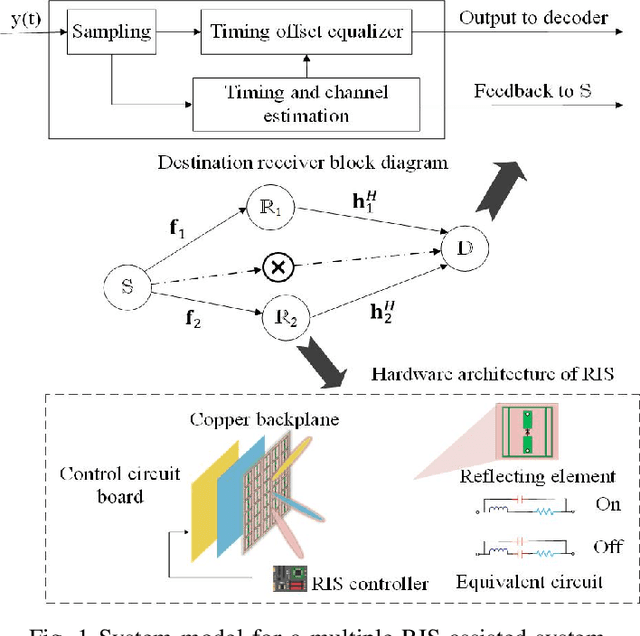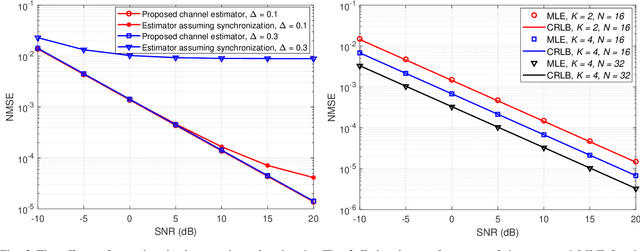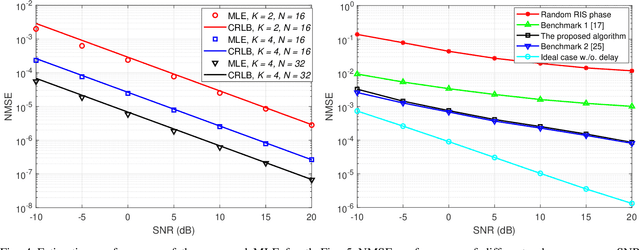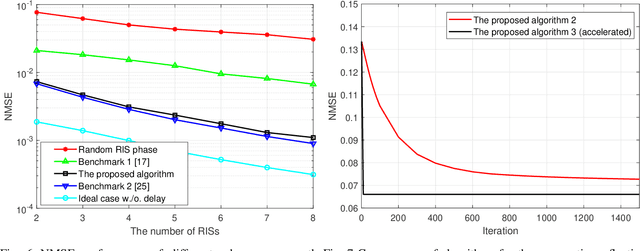Yaqiong Zhao
Joint MIMO Transceiver and Reflector Design for Reconfigurable Intelligent Surface-Assisted Communication
May 27, 2024



Abstract:In this paper, we consider a reconfigurable intelligent surface (RIS)-assisted multiple-input multiple-output communication system with multiple antennas at both the base station (BS) and the user. We plan to maximize the achievable rate through jointly optimizing the transmit precoding matrix, the receive combining matrix, and the RIS reflection matrix under the constraints of the transmit power at the BS and the unit-modulus reflection at the RIS. Regarding the non-trivial problem form, we initially reformulate it into an considerable problem to make it tractable by utilizing the relationship between the achievable rate and the weighted minimum mean squared error. Next, the transmit precoding matrix, the receive combining matrix, and the RIS reflection matrix are alternately optimized. In particular, the optimal transmit precoding matrix and receive combining matrix are obtained in closed forms. Furthermore, a pair of computationally efficient methods are proposed for the RIS reflection matrix, namely the semi-definite relaxation (SDR) method and the successive closed form (SCF) method. We theoretically prove that both methods are ensured to converge, and the SCF-based algorithm is able to converges to a Karush-Kuhn-Tucker point of the problem.
Cooperative Reflection and Synchronization Design for Distributed Multiple-RIS Communications
May 05, 2022



Abstract:To reap the promised gain achieved by distributed reconfigurable intelligent surfaces (RISs)-enhanced communications in a wireless network, timing synchronization among these metasurfaces is an essential prerequisite in practice. This paper proposes a unified framework for the joint estimation of the unknown timing offsets and the RIS channel parameters, as well as the design of cooperative reflection and synchronization algorithm for the distributed multiple-RIS communication. Considering that RIS is usually a passive device with limited capability of signal processing, the individual timing offset and channel gains of each hop of the RIS links cannot be directly estimated. To make the estimation tractable, we propose to estimate the cascaded channels and timing offsets jointly by deriving a maximum likelihood estimator. Furthermore, we theoretically characterize the Cramer-Rao lower bound (CRLB) to evaluate the accuracy of this estimator. By using the proposed estimator and the derived CRLBs, an efficient resynchronization algorithm is devised jointly at the RISs and the destination to compensate the multiple timing offsets. Based on the majorization-minimization framework, the proposed algorithm admits semi-closed and closed form solutions for the RIS reflection matrices and the timing offset equalizer, respectively. Simulation results verify that our theoretical analysis well matches the numerical tests and validate the effectiveness of the proposed resynchronization algorithm.
Cooperative Reflection Design with Timing Offsets in Distributed Multi-RIS Communications
Jul 27, 2021

Abstract:This letter investigates a wireless communication system deploying distributed reconfigurable intelligent surfaces (RISs). Existing works have assumed that perfect timing synchronization is available among all the cooperative RISs. For practical considerations, we first study cooperative reflection design for multi-RIS-aided communication systems taking into account timing synchronization errors. We aim to minimize the mean-squared error of the recovered data in the presence of timing offsets subject to the unit modulus constraints imposed on the phase shifts of the RISs. In order to handle this sophisticated nonconvex problem, we develop a computationally-efficient algorithm based on the majorization-minimization framework where the RIS phase shift matrices and the timing offset equalizer are respectively developed in a semi-closed form and a closed form. Numerical examples validate the improved performance of our proposed design compared with various schemes.
 Add to Chrome
Add to Chrome Add to Firefox
Add to Firefox Add to Edge
Add to Edge